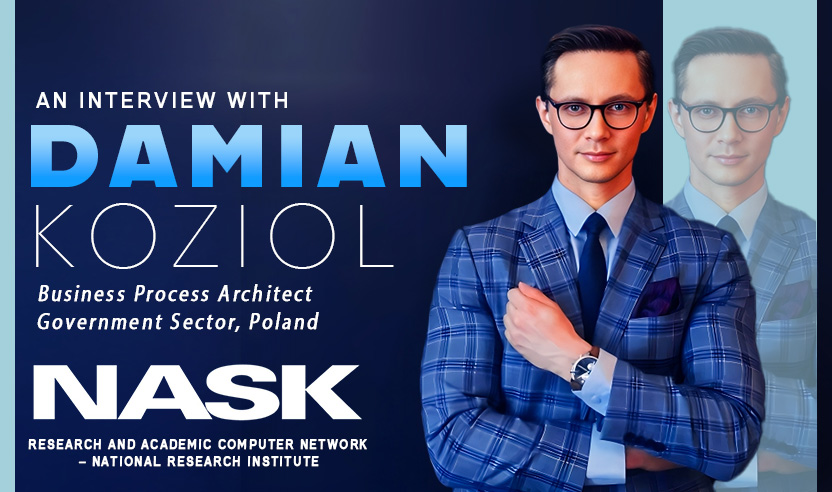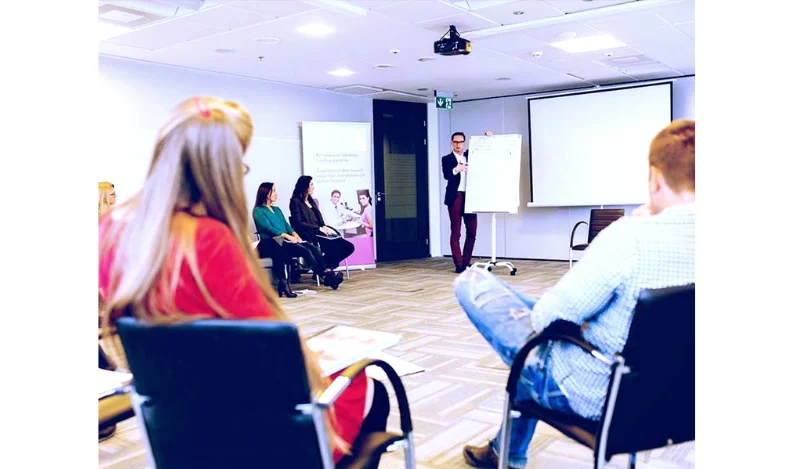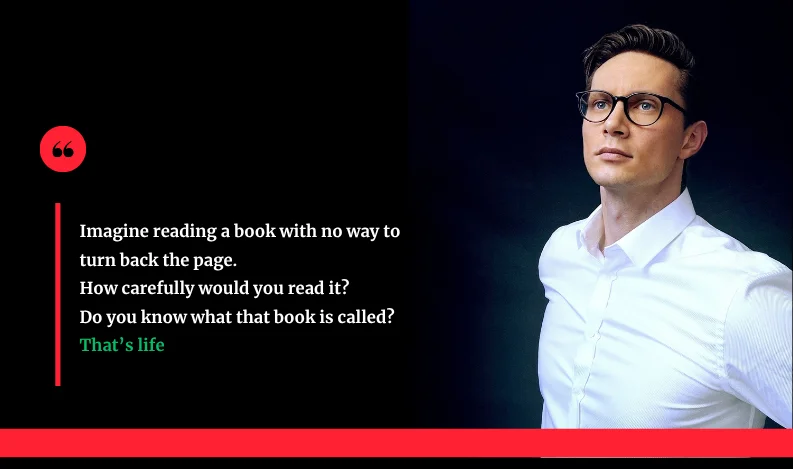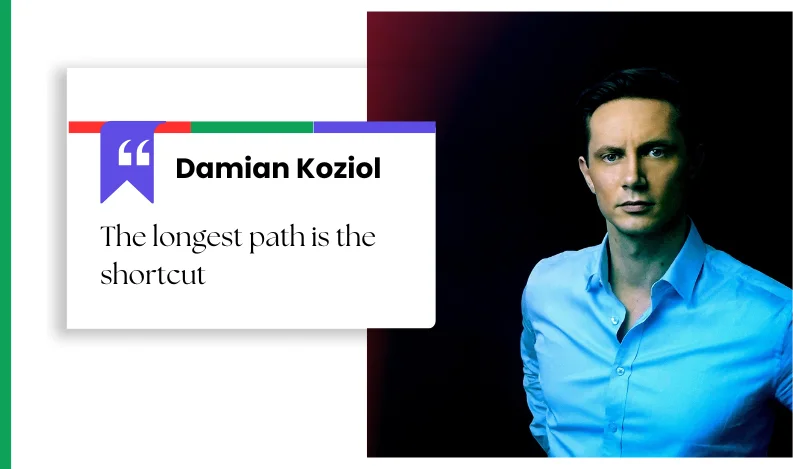
Designing the Future: Damian Koziol on Strategy and Service
In an era where complexity defines both technology and governance, few professionals stand at the intersection of innovation, public service, and strategic transformation quite like Damian Koziol. With a career built on precision, systemic thinking, and a deep commitment to process excellence, Damian has become a driving force behind some of Poland’s most critical digital initiatives, shaping not only organizational workflows but the very fabric of how citizens experience modern public administration.
From his early fascination with structured systems to his leadership roles in national projects involving AI, digital architecture, and local government transformation, Damian’s path is a testament to purposeful growth. His story is one of deliberate choices, continuous learning, and a values-based approach to leadership. In this exclusive feature, Damian shares insights from his journey, the challenges that shaped him, and the vision that guides his work today. We invite you to explore the full article and discover how strategy, empathy, and systems thinking can come together to drive lasting societal impact.

Career Foundations & Growth
Tell us about your early life, education, and career journey.
I am a Business Process Architect. My professional focus lies in the comprehensive engineering of business processes, from in-depth analytics through optimization and automation to full business process reengineering. In my work, I apply a wide array of methodologies, including Business Process Model and Notation (BPMN), Archimate, Lean Six Sigma, Statistical Process Control (SPC), Robotic Process Automation (RPA), UML, the Kaizen Management System, and Change Management, all essential for achieving process excellence across organizations.
Currently, I work at NASK-PIB (Scientific and Academic Computer Network – National Research Institute) in Warsaw, Poland, an institution that closely collaborates with the Polish government on artificial intelligence, cybersecurity, and digital transformation. My role centers on optimizing public services within the government sector and supporting the digital transition of public administration.
I’ve always been drawn to systems thinking and the mechanisms that allow people to collaborate effectively within complex structures. From a young age, I was fascinated by organizational issues, from designing solutions to analyzing why some systems succeed while others fail. My passion for optimization and improvement was rooted in a natural curiosity about the world, as well as an upbringing that valued consistency, teamwork, and collective purpose. I’ve always believed that well-designed processes can greatly influence both people’s quality of life and organizational effectiveness.
I deepened my knowledge of process management through studies focused on optimization and operational excellence. I earned postgraduate degrees from the Warsaw School of Economics, Warsaw University of Technology, and Gdańsk University of Technology. I also participated in a specialized development program in Business Process Management at Loyola Marymount University in the United States. Thanks to several years of work, I became a Lean Six Sigma Master Black Belt.
My first major and responsible role was as an auditor at the international company DEKRA, where I conducted both operational and system audits for multinational corporations. I specialized in quality management (ISO 9001) and business continuity (ISO 22301). This role taught me how to view organizations analytically and objectively, recognizing system-level risks and translating audit findings into actionable recommendations that improved organizational resilience and performance.
My next step took me to DHL eCommerce Poland, where I worked as an Operational Process Expert. I was responsible for optimizing activities nationwide, across nearly 50 branches and thousands of employees. I led transformation projects, managed data migrations, and implemented system and process digitization efforts. My approach incorporated advanced statistical methods, including:
-
Linear, quadratic, and cubic regression analysis,
-
Statistical Process Control (SPC),
-
Predictive data modeling.
These tools enabled me not only to diagnose process inefficiencies but also to predict the impact of changes and design data-driven, scalable solutions.
Following that, I joined the Solidarity Transport Hub Poland, the largest infrastructure investment in Central and Eastern Europe, where I created and implemented the process architecture from the ground up for both railway and airport components. I defined key performance indicators (KPIs), trained project teams in process mapping, and built operational frameworks that supported strategic objectives for one of Poland’s most significant national development initiatives.

Current Role & Impact
What is your current role, and what do you enjoy most about your work?
As mentioned earlier, I currently work at NASK-PIB (Scientific and Academic Computer Network – National Research Institute), where I co-lead a strategic project aimed at building the process architecture for local government units. This initiative plays a vital role in Poland’s public sector digital transformation, with the goal of creating a coherent and integrated digital environment across municipal administrations.
The project involves developing process frameworks that improve coordination, integrate IT systems, organize public registries, and streamline data flows between local and central administration. In practice, this leads to higher-quality public services, faster response times, improved system efficiency and security, and, most importantly, greater convenience for citizens.
Collaboration between the central government and local governments in this context is not only an organizational challenge but a communication one as well. It demands empathy, an understanding of local conditions, and the ability to build a shared vision.
What I value most is that this initiative isn’t just a technological upgrade, it’s a systemic shift that directly influences how people and entrepreneurs experience public administration day to day. With its implementation, municipalities gain tools to support decision-making, strategic planning, and e-services development, which translates to greater accessibility, transparency, and efficiency in public operations.
It’s important to emphasize that working at the national level, especially on projects conducted in partnership with the Ministry of Digital Affairs, requires a deep sense of responsibility, as every decision, methodology, and tool affects the quality of public services used by millions of citizens.
Our aim is that the modern information architecture of municipalities and counties isn’t just an IT project, it’s a real improvement in the quality of life for the people of Poland. Working at the national level also requires constant knowledge updates so I can deliver solutions that truly serve the public. At the center of these efforts is always the human being, the citizen, the resident, the user of public services.
In Poland, we’re increasingly working to ensure public services are accessible, simple, and consistent, regardless of where someone lives or their level of digital proficiency.
In parallel, I conduct training sessions for ministries, central offices, and other key public institutions in Poland, focusing on enterprise architecture modeling using the ArchiMate notation. By sharing my knowledge and experience, I support the public sector in enhancing analytical competencies and implementing standards aligned with leading European practices.
I also have the honor of participating in the development of Poland’s National Information Architecture Vision, allowing me to merge operational insights with long-term strategic thinking about the future digital state. As a member of the expert group co-creating this vision, I’m privileged to help shape the future model of public digital administration in our country, an accountability that requires not only system knowledge but also the ability to anticipate technological trends and societal needs.
In addition, I am a member of the AI Working Group at the Ministry of Digital Affairs, actively contributing to the section dedicated to the use of artificial intelligence in public administration in Poland.

Defining Success
What has been your proudest professional accomplishment?
I take professional pride in every stage of my journey, in each challenge I’ve managed to face and turn into something meaningful. With every step, the projects became larger, more complex, and carried greater responsibility and significance. For me, pride doesn’t come from titles or positions, it comes from progress. From knowing that each challenge brought new lessons, and that my growth wasn’t coincidental, but the result of consciously setting higher standards and seeking better solutions.
I draw immense satisfaction from the effort I’ve put into learning, from the postgraduate studies I’ve completed, the certifications I’ve earned, and the countless hours invested in developing competencies and exploring new perspectives. Continuous education broadens my horizons and helps me approach problems and projects with increasingly systemic and holistic insight.
I deeply resonate with the wisdom: “Success isn’t a destination, it’s the journey.” Because true professional growth lies in everyday effort, thoughtful reflection, and consistent action.
I often remind myself of another quote: “Progress means getting closer to where you want to be. And if you’ve taken a wrong turn, moving forward won’t bring you any closer to your goal.” This thought reminds me that humility and reflection are just as essential to growth as ambition and hard work. Sometimes, clarity of direction is more important than speed, and the ability to pause, realign, and reset your compass can be simply invaluable.
Today, I’m proud not only of what I’ve achieved, but also of my consistent choice to keep growing, and of the fact that each step in my career was taken deliberately, regardless of how difficult the path may have been.

Overcoming Challenges
What is one major challenge you've faced in your career, and how did you overcome it?
I like to believe the greatest challenge still lies ahead, because I see professional growth as a continuous journey of embracing increasingly ambitious and responsible tasks. Among the experiences so far, the most demanding is my current involvement in implementing a modern information architecture for local government units. This initiative is of tremendous scale and systemic importance. It is being carried out in collaboration with the Ministry of Digital Affairs and local government partners, with the goal of transforming and digitizing how public administration functions in Poland.
Collaboration at the intersection of central and local government brings both organizational and structural challenges. For me, success lies in empathy, open dialogue with stakeholders, and a hands-on, workshop-driven approach that enables us to co-create solutions that genuinely serve citizens, by expanding access to digital public services.
What makes projects like this especially challenging isn’t just their complexity, but the constant pressure, high expectations, and profound sense of responsibility that accompanies them. Managing stress, responding swiftly to change, and maintaining strategic clarity amid shifting variables are now critical components of success.
Hard skills alone aren’t enough, knowledge, tools, and familiarity with Agile or planning methodologies need to be complemented by equally important soft skills: communication, mental resilience, empathy, the ability to build trust, and connect diverse interests. Sometimes I feel these qualities are undervalued in today’s world, yet they form the foundation for lasting and meaningful transformation.
This experience has shown me that the biggest challenges aren’t just technical, they lie in the ability to navigate among diverse people, under pressure and within subtle interdependencies, without losing focus or cohesion. Because real transformation begins where trust, collaboration, and a shared vision of change take root, not only in systems but in the way we function as a society.
Staying Ahead
How do you stay ahead in your industry?
I focus on continuous growth and ongoing education. I regularly attend industry training sessions and conferences, and I pursue certifications, especially in areas such as process management, artificial intelligence, and the digitization of public services. As a consultant and trainer, I also have the unique opportunity to share knowledge with others, which compels me to reflect on my own competencies and consistently update my perspective.
I monitor industry reports and analyze global trends in process architecture and digital transformation of public administration, particularly in the context of EU regulations and directions set by European institutions. My involvement in the local government information architecture project, which I’m helping to lead, demands not only expert knowledge but also a keen awareness of the latest standards, tools, and societal expectations.
In addition, as a member of the AI Working Group at the Ministry of Digital Affairs, I actively contribute to discussions on applying artificial intelligence in public administration. AI is no longer just the future, it’s the present. It’s a transformative technology that is already reshaping how institutions operate, how we communicate, and how decisions are made. That’s why staying current with technological, legislative, and ethical trends isn’t optional, it’s essential.
For me, development isn’t just about refreshing knowledge, it’s about consciously shaping the future, step by step, decision by decision.

Advice for Professionals
What advice would you give to young professionals aiming for success?
The most important thing is knowing why you do what you do. For me, that question always begins with the drive to create value, for the organizations, institutions, and people I collaborate with and serve through my work. That motivation has guided me through each stage of my career: I invest in myself, expand my competencies, and take on challenges that bring greater responsibility. I don’t fear change or uncertainty, because I know that behind each shift lies an opportunity for growth, both personal and for the teams I support.
There are no shortcuts on this path. There will be stumbles, crises, moments of doubt, but those are the experiences that shape you and build resilience. That’s why I often remind myself: “The longest path is the shortcut.” It’s a reminder that seemingly easy solutions often lead to dead ends, while lasting change requires patience and consistency.
Success isn’t about reaching a goal quickly, it’s about consciously taking step after step. It’s not just about metrics, promotions, or titles, it’s about meaning, impact, and knowing your everyday work creates real value. Find mentors, ask questions, observe. Keep learning, because learning isn’t a moment on a timeline; it’s a never-ending process.
But equally important is the question: Why?
For me, the “why” is a personal vision. A future filled with peace and simple happiness. I imagine waking up in a house near nature, far from the noise, surrounded by greenery, coffee in hand, and a little crowd of animals: dogs, cats, and maybe a few unexpected creatures I’ve always wanted to have. I imagine sharing that morning with someone I love, a partner with whom I’ve built a life based on support, equality, and a shared journey. Because no vision is as fulfilling as one you can share.
One thing too often overlooked in the success narrative: human relationships. Friends, colleagues, loved ones, they’re our companions on the journey. You have to care for these bonds and nurture them with attention, because in the chase for goals, it’s easy to lose them. And sometimes, rebuilding isn’t possible. As the old saying goes: “There are two things money can’t buy, lost time and the genuine emotions of others.”
Balance is key.
In all of this, don’t forget about work-life balance. Work matters, but so does everything beyond it. Physical activity, movement, time outdoors, not only for health, but to clear your mind, gain perspective, and recharge. Taking care of your body improves well-being, builds stress resilience, and sharpens focus. It’s an investment in yourself that pays off in both your professional and personal life.
I live intensely and dynamically today, so that one day I can look back and say: It was worth it. Because success isn’t a sprint, it’s a steady march guided by your own compass. And it’s worth having a goal that’s measured not just by outcomes, but by peace, fulfillment, and what we build through relationships, daily routines, and in one another.
There’s a quote I once read in a book — I don’t even remember the title anymore — but the words stayed with me. They come back to me especially in difficult moments, when I need to pause, reflect, and find direction again:
"Imagine reading a book with no way to turn back the page.
How carefully would you read it?
Do you know what that book is called?
That’s life."
This quote reminds me that every day is a chance we don’t get back. That it’s worth living with intention, awareness, and purpose. Because while we can’t rewind life, we can write each new page with courage and meaning.
Conclusion
Damian Koziol’s journey is not just a narrative of professional milestones, it’s a powerful example of how purpose, discipline, and systems thinking can shape meaningful change at both organizational and national levels. His work underscores the idea that true transformation begins with clarity of vision, but it’s sustained through empathy, resilience, and the consistent pursuit of better solutions.
As Poland continues to advance its digital landscape, leaders like Damian serve as a reminder that behind every system upgrade or policy shift are people, citizens, public servants, and communities whose lives are touched by every strategic decision. His story encourages young professionals and seasoned experts alike to embrace complexity with courage, to lead with intent, and to measure success not only by progress, but by the impact it leaves behind.
Also Read:-



Recent Comments:
No comments yet.